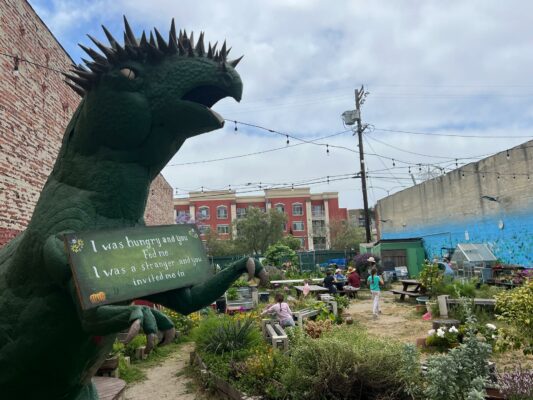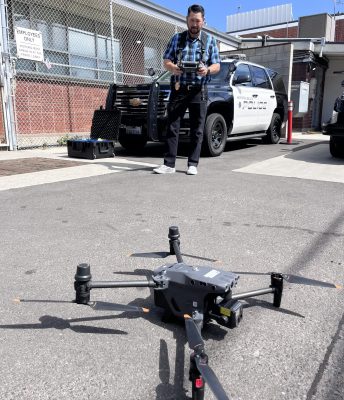
Host Town Manhattan Beach began as a hopeful thought floating through the minds of longtime Special Olympics volunteers.
John Peetz, a board member of Special Olympics Southern California, returned home from a meeting last year regarding the Los Angeles World Games. Intrigued by the idea of the Special Olympics Host Town program discussed at that night’s meeting, he described it to his wife Judy.
The Host Town program recruits cities to host about 100 delegates from across the participating Special Olympics delegations for about five days, affording athletes opportunities to acclimate to the weather, enjoy the local culture and to prepare for the games.
“Do you think this would work in Manhattan Beach?” he asked his wife.
“Well,” she said. “I don’t see why not.”
From there, the race was on.
Now, in less than a week, planes from across the world will land at Los Angeles International Airport, and for cities across California, months of planning will finally come to fruition.
The Special Olympics World Games begins July 25, bringing together more than 10,000 athletes and coaches from 177 countries and as part of the Special Olympics Host Town program, the Beach Cities will open their arms to hundreds of athletes from seven countries: Hungary and Nepal in Manhattan Beach; Belgium and Belize in Hermosa Beach; and Benin, Haiti and Suriname in Redondo Beach.
Host Town Manhattan
Shortly after their discussion, the Peetzes reached out to Russ and Charlotte Lesser, the former mayor and first lady of Manhattan Beach, who signed on immediately. Just as quickly, Judy Peetz was named the organization’s chair, and the organization began reaching out.
Everything fell into place quickly for Manhattan Beach’s committee. Though there were concerns regarding hotel lodgings, owing to the popularity of the CrossFit Games occurring at the same time, rooms were easily secured for their visitors from Hungary and Nepal.
But when disaster struck in Nepal during April’s devastating 7.8 magnitude earthquake, Host Town Hermosa Beach was hanging by a thread.
“We’ve had a small delegation from Nepal — three athletes, a coach, and the delegation head — and we didn’t hear anything for several weeks,” Judy Peetz said. Emails to the delegation and to representatives from the World Games yielded nothing — until three weeks later, when the volunteer head of the Nepalese delegation reached out.
According to Peetz, she was thanked for her kinds words, and then given an outline of the situation. “He said they have a million living in the streets, afraid to go into buildings; that the aftershocks are continuing to shake them; and that his father had died of a heart attack in the aftermath of the quake,” she recalled.
But in the wake of the disaster, the Nepalese delegation increased its strength, bringing two more athletes and a second coach.
Manhattan Beach’s only concern, then, was finding translators outside of delegate liaisons — and that was easily taken care of community volunteers.
“I thought I was going to have to call up to UCLA and see if they had any students studying from Hungary to come down and help us out,” Peetz said. But, as with the numerous donations supporting Host Town Manhattan Beach, the community was able to come through again.
“We have two Hungarian-American families in Manhattan Beach, who have been wonderful,” Peetz said. “They’ve called on friends and we have plenty of interpreters.”
Host Town Hermosa
Host Town Hermosa Beach chairwoman Jody Leventhal calls her city “the heart of the South Bay,” and feels she’s proven that with the way the community has come together to support the program.
“We’ve got an amazing group of local residents, really generous individuals, who stepped up,” she said, citing the many who joined together to help push Hermosa Beach toward supporting its delegations from Belgium and Belize.
The organization, she said, began in October, and was inspired, in part by the work her daughter, Laura, has done in working for the Special Olympics. Laura, Jody said, noticed that among Host Towns, the South Bay was woefully underrepresented. Once they established a base, with the help of former Rotary president Travers Devine, Hermosa was off to the races. “We knew that, if we could get support here, we’d be well on our way,” Leventhal said.
They got their support: More than $100,000 in donations from Hermosa businesses, including $10,000 from the owner of Okell’s Fireplace. Host Town Hermosa Beach reached out to restaurants, bars and businesses in town to bring people on board at “minimum levels,” Leventhal said. She noted that even less profitable events, such as the Portable Handprint Wall, were a great help. “It was really fun, and beneficial in so many ways,” she said. “Hermosa came through a lot of political challenges last year, and that wall was a fun way for people to come out and put their hands together for some fun.” Hermosa will also be giving their guest delegates an opportunity to add their hands to the wall.
“I think it came together beautifully,” she said. “Everyone is having fun now, after pulling together an event so large in record-breaking time — it’s an acceptance of our own differences, and the tolerance and determination to get through it.”
“We were jumping over hurdles just like the track and field athletes,” she said.
Host Town El Segundo
Forming in early January, Host Town El Segundo’s late start seems to have put them at a significant disadvantage — initial aims of hosting three delegations have been pared down to just hosting for Barbados and Macedonia.
Though she acknowledges the hurdles her community is facing, HTES committee member Sally Martin believes that El Segundo’s greatest strength is that their efforts have been significantly community-driven.
“I don’t know what other towns are doing, but I’ve heard that large corporations are helping in big ways,” Martin said. “Our corporations are helping in ways that we appreciate, but it’s the community making this happen.”
The key, she says, has been near-weekly fundraising drives, including concerts in the park and snow cone sales. “It’s made all the difference,” she said. “It’s because El Segundo is the community that it is; people have stepped up to the plate to support the upcoming event.”
And though fundraising has been El Segundo’s most significant stumbling block, her husband and fellow committee member Laurence Martin says the city has an ace in its back pocket: the Los Angeles Lakers, Kings and Mattel are waiting in the wings to shore up any gaps in the financing the city might be facing.

Host Town Redondo
The morning of Wednesday, June 17, Dinah Lary was feeling at ease, as Redondo Beach’s Special Olympics planning had fallen into place. With less than a month before the Special Olympics World Games, practice facilities had been secured, cultural events had been set up, and the city’s guest delegations from Benin, Haiti and Suriname had their lodging prepared.
By evening, that ease had evaporated.
First, Lary heard sirens from her South Redondo home. Then, she got a text message, turning those sirens into personal alarm bells.
The message was from fellow Host Town Redondo Beach member April Pitcairn, saying that the Palos Verdes Inn was on fire — the South Redondo hotel had promised to rent 22 rooms for the foreign delegations the city would be hosting.
Lary was stunned, sending a simple “What?” in response. The PV Inn was hugely important to Host Town Redondo Beach’s plans, with sizable parking lots and meeting rooms, making it de facto headquarters for Team Redondo.
Though immediate discussions with the management of the Palos Verdes Inn seemed positive, further investigation three days later confirmed the worst: the hotel would be closed for the foreseeable future, throwing Team Redondo’s plans out the window.
“Everything was going way too smoothly,” Lary said.
Redondo Beach’s efforts toward becoming a Special Olympics Host Town started about six months after the other Beach Cities. It’s a delay Lary attributes to the rise in tensions caused by the March 3 General Election, when debates over Measure B overtook the city.
Things shifted into gear the week of Christmas when Redondo Beach Mayor Steve Aspel got a call from Body Glove president Russ Lesser, asking his city to join Manhattan and Hermosa.
That’s when Aspel called “the usual suspects” together for a meeting at Dive N Surf. “We had people show up that you know you can count on to step forward,” Aspel said at a recent Redondo Beach Round Table event. Lary, Jeff Melodia and Barbara ramsey-Duke were among those that stepped forward, and took the mayor’s request to get the city moving as their marching orders.
“Jeff and Barbara and I have similar styles,” Lary said. “We know each other, trust each other and tend to get things done.” The three came together “like a committee on steroids,” putting together a plan, building their organization further, lining up sponsors and hotels, and then executing.
“We were killing it in the beginning,” Lary said. “We jumped ahead of where everybody else was in fundraising,” as people and organizations came out of the woodwork to support Redondo’s Special Olympics efforts.
From individuals writing $5,000 checks on the spot to organizations such as AES, Athens Services, Body Glove, the Salvation Army, the Redondo Beach Rotary Club and the Redondo Beach Unified School District, it seemed as if the entire city had come together to offer support.
But the Palos Verdes Inn fire was a startling blow to the organization. As Host Town organizers across the Beach Cities learned early on, summer is when area hotels make their money — many hotels were booked solid, and Team Redondo knew that they couldn’t squeeze any more from their current partners at the Best Western Redondo Beach Inn, or the Crowne Plaza Hotel.
So, Lary put out a call for help (“all in capital letters,” she said) to city hotels, catching assistance from the Hilton Garden Inn and Residence Inn hotels in North Redondo, getting the best rate they could manage. Still, it was far beyond what Team Redondo had budgeted.
“We all looked at each other and thought ‘Well, we’re throwing it out to the Special Olympics gods,” Lary said. The project, she and her teammates felt, was too wonderful to fail — something good had to happen, she thought.
Then, shortly after a meeting with Northrop Grumman, something good came — a text message, saying that the company was donating $10,000 to assist in the cause. “They’re our champions,” Lary said. “They came to the rescue, and they didn’t even know about the budget. It just happened to be the right timing.”
“Hosting an event like this in LA is different than hosting anywhere else — budgets are different, as are expectations and resources,” said Special Olympics program coordinator Laura Leventhal. “These host towns and volunteers took on a lot, and have dedicated an immense amount of time.”
“There were plenty of communities who didn’t want to take it on, and didn’t think they could make it happen,” Leventhal continued, “and plenty of communities didn’t think they could work together — ones that I think are seeing this turn out the best are the ones that embraced it and ended up working together.”
In the spirit of collaboration, the Beach Cities are hosting a joint send-off to mark the end of their Host Town festivities, and are including their fellow Host Town cities of El Segundo and Hawthorne in the July 24 celebration at the Redondo Beach Performing Arts Center.
“It’s been fun to get to know the different committee members,” Lary said. “They’re great, and all of the committee chairs in the South Bay are strong, dynamic people.”
Everyone is getting it, Lary continued. “It isn’t about us. It’s bigger than us — we’ve got athletes coming here from all around the world. Anything we do is going to be so special for them.”











